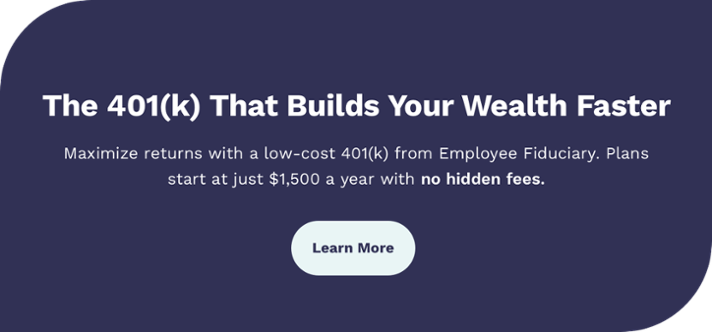To retire as soon as possible, you must avoid three 401(k) pitfalls throughout your working years - high account fees, underperforming investments, and improper asset allocation. These pitfalls can cost you hundreds of thousands of dollars by the time you retire. The best small business 401(k) plans make these pitfalls easy to avoid – which can help you retire years sooner. Given the stakes, you should settle for no less.
Not sure your small business 401(k) plan fits the bill? Here are the 401(k) pitfalls you want to avoid and how certain features of the best 401(k) plans can help you avoid them.
The 401(k) Pitfalls You Want to Avoid
To retire as soon as possible, you must avoid three 401(k) pitfalls throughout your working years:
- High account fees – ALL 401(k) providers charge fees for delivering for plan administration services such as asset custody, participant recordkeeping, Third-Party Administration (TPA), and professional investment advice.
Your plan’s administration fees are not paid by your employer, they will be deducted from plan assets. The portion deducted from YOUR ACCOUNT will lower your investment returns dollar-for-dollar. High account fees will reduce your 401(k) investment returns needlessly.
- Underperforming investments – 401(k) investments come in two basic forms - active and passive. Active funds try to beat their market benchmark (e.g., S&P 500 index), while passive funds try to match it. Index funds are the most popular form of passive funds.
The irony? Studies show index funds tend to outperform comparable active funds (i.e., funds with the same benchmark) over time. Underperforming investments are active funds that underperform comparable index funds, net-of-fees.
- Inappropriate asset allocation – investing your 401(k) account balance among different asset categories, such as stocks, bonds, and cash is called asset allocation.
Maintaining an appropriate asset allocation over the years based on your target retirement date is important. Otherwise, you could miss out on gains by investing too conservatively when young or sustain unrecoverable losses by investing too aggressively when older.
The stakes are high. These pitfalls could cost you hundreds of thousands of dollars in lost principal and compound interest by the time you retire.
How the Best Small Business 401(k) Plans Avoid These Pitfalls
The best 401(k) plans make it easy to avoid the pitfalls that needlessly lower investment returns. Here are their features:
- No “hidden” account fees– 401(k) administration fees paid from plan assets can be “direct” or “indirect” in nature. Direct fees are deducted from your account balance, while indirect fees increase the cost of your investments – lowering their returns. Indirect administration fees are often called “hidden” account fees because 401(k) providers have no legal obligation to report their dollar amount in DOL-mandated fee disclosures or benefit statements like direct fees. The most common form of indirect fees is revenue sharing.
All direct and indirect 401(k) administration fees have the same net effect – they’ll reduce your investment returns dollar-for-dollar. That means you want to keep their total amount as low as possible. Only direct fees make it easy to know how much your 401(k) account is paying.
- Cost-efficient investments – Active funds can cost several times more than comparable index funds. The problem – few offset their higher cost with higher returns over long periods of time. In other words, they are not cost-efficient. Cost efficiency is the key to avoiding underperforming investments.
I have never seen an index fund from leading providers such as Vanguard, Fidelity, or Schwab that isn’t cost-efficient. They meet their investment objective (market-correlated returns) for low fees across the board. You can try to earn more net-of-fees with active funds, but the odds are not on your side.
- Professional investment advice – Most retirement savers need help to maintain an appropriate asset allocation over time. If you’re in this boat, I strongly recommend you seek professional investment advice to avoid inappropriate asset allocation.
Most 401(k) plans today offer one or more of the three basic forms - Target-Date Funds (TDFs), a financial advisor, or “robo” (algorithm-based) advice. To pick the best form for you, you should weigh its pros and cons.
Your Additional Savings Can be Dramatic!
Avoiding 401(k) pitfalls can mean dramatically higher account returns for you. An Aon Hewitt study found professional investment advice increased the investment returns of plan participants by 3.32% annually, while our latest 401(k) fee study found that some plan participants were paying as much as $2,181.34 in annual administration fees.
In short, you owe to your future self to avoid the 401(k) pitfalls that rob investment returns. Even small annual savings today can mean much greater savings in retirement due to the power of compound interest. If your 401(k) plan doesn’t make that job easy for you, lobby for a better one.


